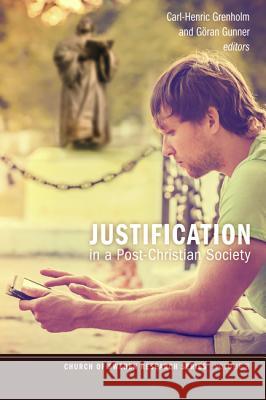Justification in a Post-Christian Society » książka
Justification in a Post-Christian Society
ISBN-13: 9781625648891 / Angielski / Miękka / 2014 / 272 str.
Justification in a Post-Christian Society
ISBN-13: 9781625648891 / Angielski / Miękka / 2014 / 272 str.
(netto: 145,96 VAT: 5%)
Najniższa cena z 30 dni: 151,14
ok. 16-18 dni roboczych.
Darmowa dostawa!
Since the Reformation in the sixteenth century, Lutheran traditions have had a great impact on culture and politics in many societies. At the same time Lutheran churches have impacted personal faith, basic morality, and ethics. Modern society, however, is quite different from the time of the Reformation. How should we evaluate Lutheran tradition in today's Western multicultural and post-Christian society? Is it possible to develop a Lutheran theological position that can be regarded as reasonable in a society that evidences a considerable weakening of the role of Christianity? What are the challenges raised by cultural diversity for a Lutheran theology and ethics? Is it possible to develop a Lutheran identity in a multicultural society, and is there any fruitful Lutheran contribution to the coexistence of different religious and nonreligious traditions in the future? ""The present volume documents that the Lutheran theological tradition is still doing well. These contributions testify to a Lutheranism not captured in the past, but actively engaging with contemporary issues in society and culture; a Lutheranism both open, self-critical, constructive, and creative. This is a must read for anybody who wants to see how the Lutheran tradition related to the wider theological dialogue, and what it has to contribute to the ecumenical reflection about the relevance of Christian faith for people of today."" --Jan-Olav Henriksen, Norwegian School of Theology, Oslo, Norway ""This volume emanating from a 2013 conference in Uppsala, Sweden on Lutheran Tradition in Transition makes a critical but not unsympathetic evaluation of the past and discusses what would be a reasonable Lutheran position in the future. Well-known Lutheran theologians, both from Europe and the USA, focus on three themes, justification, Lutheran theology and ethics, and the Reformation as a model for interpreting the present. The contributors convincingly show that Lutheran theology, though diverse in itself, still makes an important contribution to the theological discourse."" --Hans Schwarz, Regensburg University, Regensburg, Germany ""This book shows how the Lutheran doctrine of justification, despite its historical location in the 16th century--when examined with a self-critical ambition, as this book certainly does--has the capacity of challenging common values and ways of thinking, not least in societies marked by a post-Christian mentality."" --Bo Kristian Holm, Aarhus University, Aarhus, Denmark Carl-Henric Grenholm is Senior Professor of Ethics in the Department of Theology, Uppsala University, Sweden. Goran Gunner is Associate Professor in Mission Studies, Uppsala University, and Researcher at Church of Sweden Research Unit.
Since the Reformation in the sixteenth century, Lutheran traditions have had a great impact on culture and politics in many societies. At the same time Lutheran churches have impacted personal faith, basic morality, and ethics. Modern society, however, is quite different from the time of the Reformation.How should we evaluate Lutheran tradition in todays Western multicultural and post-Christian society? Is it possible to develop a Lutheran theological position that can be regarded as reasonable in a society that evidences a considerable weakening of the role of Christianity? What are the challenges raised by cultural diversity for a Lutheran theology and ethics? Is it possible to develop a Lutheran identity in a multicultural society, and is there any fruitful Lutheran contribution to the coexistence of different religious and nonreligious traditions in the future? ""The present volume documents that the Lutheran theological tradition is still doing well. These contributions testify to a Lutheranism not captured in the past, but actively engaging with contemporary issues in society and culture; a Lutheranism both open, self-critical, constructive, and creative. This is a must read for anybody who wants to see how the Lutheran tradition related to the wider theological dialogue, and what it has to contribute to the ecumenical reflection about the relevance of Christian faith for people of today.""--Jan-Olav Henriksen, Norwegian School of Theology, Oslo, Norway""This volume emanating from a 2013 conference in Uppsala, Sweden on Lutheran Tradition in Transition makes a critical but not unsympathetic evaluation of the past and discusses what would be a reasonable Lutheran position in the future. Well-known Lutheran theologians, both from Europe and the USA, focus on three themes, justification, Lutheran theology and ethics, and the Reformation as a model for interpreting the present. The contributors convincingly show that Lutheran theology, though diverse in itself, still makes an important contribution to the theological discourse.""--Hans Schwarz, Regensburg University, Regensburg, Germany""This book shows how the Lutheran doctrine of justification, despite its historical location in the 16th century--when examined with a self-critical ambition, as this book certainly does--has the capacity of challenging common values and ways of thinking, not least in societies marked by a post-Christian mentality.""--Bo Kristian Holm, Aarhus University, Aarhus, DenmarkCarl-Henric Grenholm is Senior Professor of Ethics in the Department of Theology, Uppsala University, Sweden.Goran Gunner is Associate Professor in Mission Studies, Uppsala University, and Researcher at Church of Sweden Research Unit.











